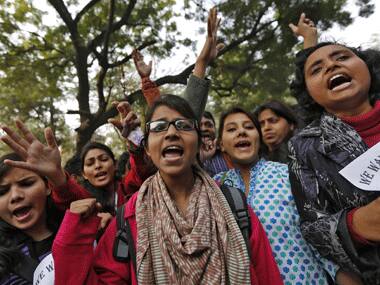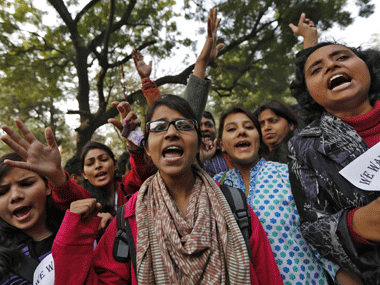On Monday night, a 20 year old woman in Birbhum, West Bengal, was gangraped by 13 men upon the orders of a “tribal court”. According to a report in The Times of India: On Monday afternoon, a group of tribal men found her sitting with the man and dragged both of them to the village ’than’ (a religious place). A kangaroo court was hastily assembled under the tribal chieftain. The youth was asked to pay a fine of Rs 25,000 and warned that if he didn’t pay up, village youths “would have fun with the girl”, said a police officer. On Monday night, the girl was forced into a shed and raped till Tuesday morning. The rapists forced the family to stay indoors all of Tuesday. Bleeding from severe injuries, the girl somehow survived. Late Wednesday afternoon, the family slipped out and took her to Labhpur health centre, where the doctors advised she be taken immediately to Bolpur subdivisional hospital. Unsurprisingly, the widespread reaction to this incident has been appalled horror. Social media is buzzing with furious shock at the fact that a woman is not only raped by 13 men, but that this was considered a “punishment” and that she wasn’t allowed to reach a hospital after being raped. Instead of providing her protection from her rapists, the “tribal chieftain” joined in as one of the rapists. Everyone has demanded strict action against the perpetrators, all 13 of whom have been placed in judicial custody. The governor of West Bengal has demanded corporal punishment be meted out to all of them. While it is heartening to know the rapists have been caught, it’s worth keeping in mind that this gang rape is a symptom of a problem that will not be solved by either arrest or the harshest sentence. What happened in Birbhum is an example of the terrible power that local councils enjoy in the rural India and so long as they remain in the position of prominence that they currently enjoy, crimes like this gang rape will continue unabated. Whether termed a “tribal court” or known as khaps, local councils are part of a long-standing tradition that has been around for much longer than the political entity that is India. Made up of members of a community, these bodies comprise people who are at the top of the local hierarchy. Theirs is not an elected position and their decisions supposedly adhere to a local, cultural code, rather than the Indian Penal Code. While khaps and their local variants aren’t always oppressive or criminal in their conduct, their verdicts are often in direct opposition to the liberties guaranteed by the Indian constitution. In 2011, the Supreme Court described khaps as “kangaroo courts” that were “ wholly illegal”. [caption id=“attachment_1356889” align=“alignleft” width=“380”]  Protest against rape. Agencies.[/caption] None of this has threatened these councils, as is obvious from the most recent example of a “tribal court” in action in West Bengal. They operate as a law unto themselves. As Shashi Panja, West Bengal’s minister for Women and Child Development, told CNN-IBN when speaking about the gang rape in Birbhum, “the government has no say in this”. So why do these kangaroo courts remain in India? Why aren’t they brought under the state government’s jurisdiction and forced to act according to the law that is meant to rule the country? Ostensibly, these local councils have been allowed to operate as they wish because their actions are believed to govern minor, local issues. Marriages, family disputes, that’s the sort of thing they look at and the logic that has traditionally been put forward is that these are matters connected to practices particular to a region and therefore should be decided by those familiar with the specific social context. In a country that is sharply divided between rural and urban, these councils have been projected as a community’s defense and representative against the non-traditional modernity of urbanised India. However, the real reason for local councils thriving is murkier. These local councils are remnants of the older, feudal social system that was supposed to have been replaced with democracy. That hasn’t quite happened. The influence a local council like a khap exerts over the community is immense even today. They’re allowed to continue because they’re influential allies when it comes to garnering votes from interior regions of the country. Politicians rarely admit to these alliances, but they get into implicit agreements with such councils that secure power for the council and votes for the political party. Grass root level voters follow the local council’s lead, often because not doing so can result in vicious punishment. Their freedom to deliver brutal punishments helps maintain these kangaroo courts’ position of power in communities. This is why no matter which party may be in power, there has been no attempt to either dismantle these councils (despite their dubious legal status) or render them ineffective. These councils are not exclusive to north India. They exist all over the country. In Bengal, it’s a “tribal court”; in Tamil Nadu, it’s a “katta panchayat”; in Haryana, it’s the khap. They have retained their power over their communities partly because they offer settlements much quicker than the legal process can provide, but also because they have the tacit support of the political establishment. And so, honour killings are ordered and executed. Women are humiliated, abused and raped as punishment. Men are beaten up and butchered for shows of resistance. These kangaroo courts, confident of the grey area they occupy legally, get away with ordering and enacting criminal actions. The state and the police will, at best, try to help the victims, but the system of khaps and such councils remains untouched. They’re not just allowed to survive, but thrive even. There’s always the comfort of knowing the upper middle class, urban sections of the country that influence policies are not directly affected by these rural phenomena. We’ll tweet and express outrage, but khaps and tribal courts are not our reality. They’re distant horrors that appear occasionally in news reports. These local councils count on us forgetting they exist and focussing, instead, on the victims of the crimes that have been committed upon their orders. So while it’s good news that the 13 men who raped the young woman from Birbhum are under arrest, it’s imperative that Indians push political parties to hold these kangaroo courts accountable for their decisions. After 66 years of independence, it’s a disgrace that in the Indian heartland, it isn’t the rule of the law that applies, but prejudice at its most vicious.
Whether termed a “tribal court” or known as khaps, local councils are part of a long-standing tradition that has been around for much longer than the political entity that is India. Made up of members of a community, these bodies comprise people who are at the top of the local hierarchy.
Advertisement
End of Article


)
)
)
)
)
)
)
)
)



